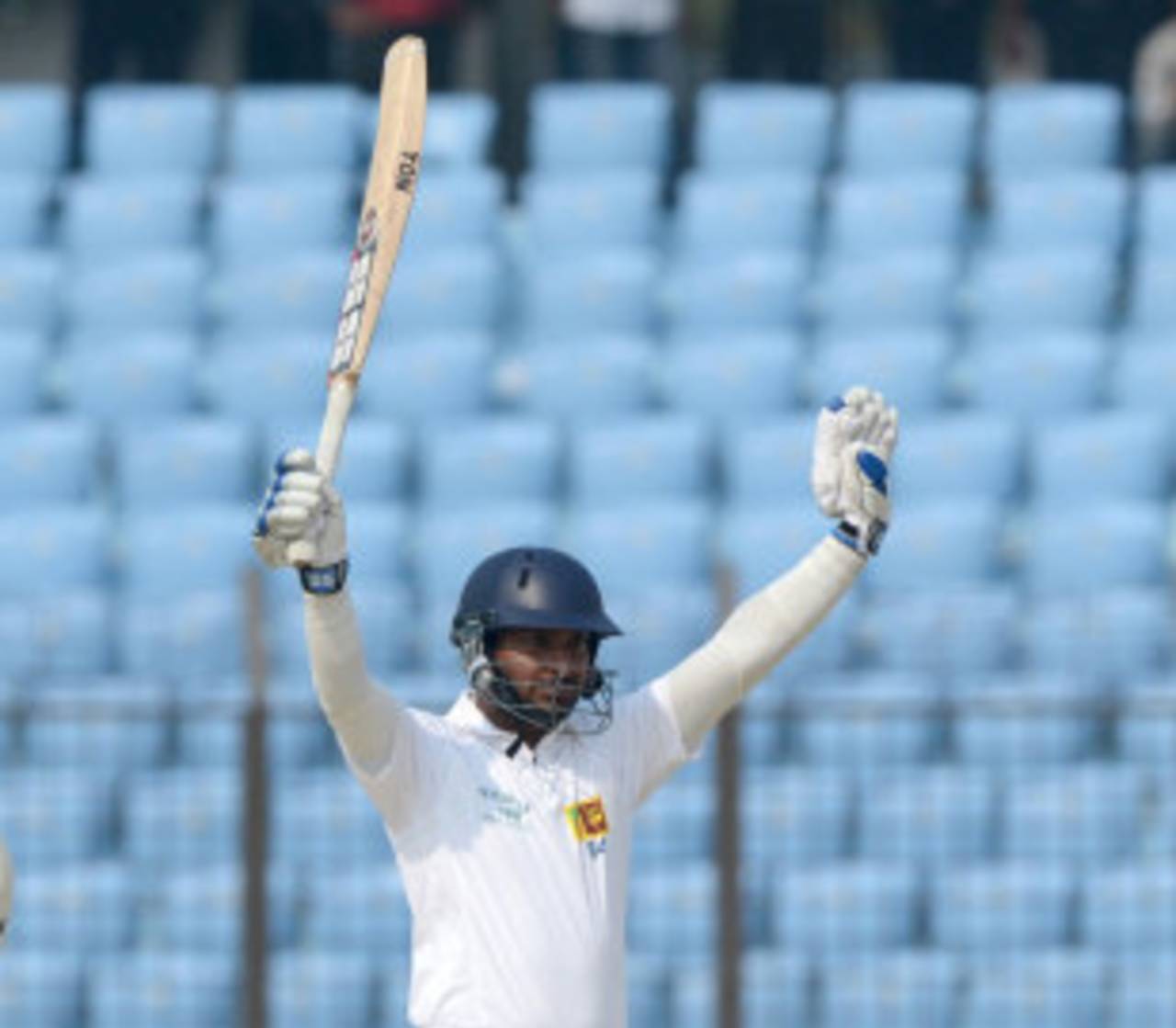Understated goes firmly with
Kumar Sangakkara, and it was no different in his celebrations after his maiden Test triple-century, against Bangladesh in Chittagong. A cake was cut in the dressing room just before the team boarded the bus to the hotel. His long-time friend Mahela Jayawardene fed him the first piece and beforehand, he paid tribute to the environment in the Sri Lankan inner sanctum as well as his intensity in the younger days.
"I don't think there is a big secret," Sangakkara said. "I think it has mostly been a lot of hard work in the nets, trying to learn as much as I can every time I play, not losing my positive intent to score, trying to stay one step ahead of the opposition. A lot of throwdowns, batting in the nets and thinking a bit about my own batting."
"The environment in our dressing-room had a lot of room for improvement. We have always pushed each other really hard, not just in skills but also in fitness and strength levels. That kind of motivation and confidence from the rest of the group has really helped me. So we have had a lot of inspiration, form Aravinda de Silva and Sanath Jayasuriya, so I was lucky to grow up in that environment."
Sangakkara reminisced his first substantial innings, against South Africa in early
2001, as probably closest to being his most favourite knock. Sri Lanka were following on after a poor first innings, and Sangakkara was promoted by Jayasuriya to open the batting with Marvan Atapattu. He made 98 in five and a half hours, the entire length of the second innings as he was the last man to be dismissed.
"A really good innings doesn't necessarily mean the number of runs you have scored. I always go back to my 98 in South Africa in my first ever away tour. That was when I thought I could play Test cricket.
"Until that time, I wasn't really sure if I could belong and compete, but that innings changed how I looked at myself and it really taught me what it takes to be a Test player. I think that innings set the foundation for what has happened since then."
There are fundamental differences between his knock in Centurion and the 319 in Chittagong exactly thirteen years later. Back then, it was against the battery of Allan Donald, Shaun Pollock, Makhaya Ntini and Jacques Kallis. Here it was a more comfortable setting, on a flat deck with plenty of scoring options and against a bowling attack that had one seamer, two spinners and plenty of part-timers.
But like playing on any wicket, Sangakkara assessed the surface quickly and decided they had to be patient. "It was a case of first getting used to the pace of the wicket," he said. "It was kind of a difficult wicket to get used to. The fields were quite a bit defensive, so it was hard to keep rotating the strike as easily as we thought we could.
"If there had been a bit more pace we could have penetrated the field, but without that it was just a waiting game. When I really got set it was a case of trying to dominate. When I really tried to go over the field I wanted to do that. But if I had the opportunity to rotate the strike I would do that. So it was a case of continuously trying to score runs and having a positive intent."
What set up the big score in the first innings was Sangakkara's 178-run third-wicket stand with Jayawardene on the first day. The pair is currently fourth on the list of
all-time batting partnerships in Test cricket and Sangakkara feels that they bat almost similarly which helps their chemistry.
"I think we bat pretty much the same, I think we feed off quite well, in sense of attack and defense," he said. "I think we read each other well, when one goes at the bowling, the other rotates and vice versa so it is good to have that kind of rapport and understanding.
"It really helps you out there to build partnerships, and I think that's something that all batsmen should work towards. It's really important to have that because the feedback that you get in the middle helps you kick off in that particular innings."
Mohammad Isam is ESPNcricinfo's Bangladesh correspondent. He tweets here
